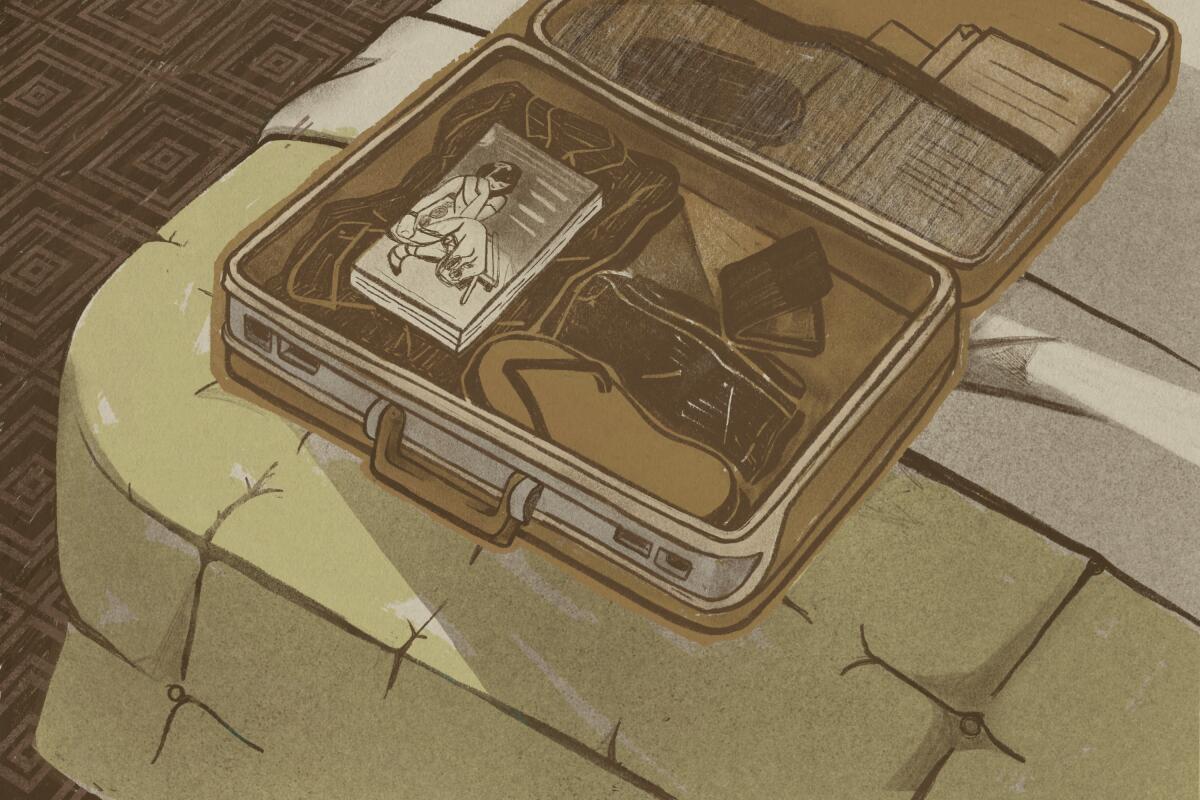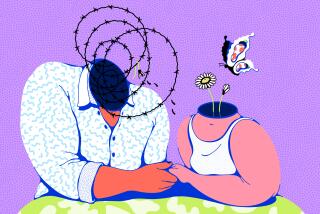Guest writer: What my father carried in his secondhand briefcase told me everything

- Share via
My father was among the last supermarket meat-cutters who could break down sides of beef when they were delivered to the store. He could also maximize a profit margin. For years, he managed the meat department where he worked, and his framed 8-by-10 picture hung with those of the other managers, my father in a tie and blue sports coat, posed seriously before a backdrop of fake law books. He often boasted of his department being the most profitable in the region.
He also believed that if I had a trade, I could always make a living. Instead of sending me to the local high school, my parents enrolled me in a Catholic technical school. There I learned outdated printing techniques, developed photos in a dank darkroom, and cut color-separation projects by hand as the industry became entirely digital. Reports from recent, unemployed alumni of the school made clear that my future should be elsewhere, but my father saw my decision to attend college as squandering his investment.
I chose UC Riverside because they had a creative writing minor. I didn’t know exactly what I wanted to write, only that I wanted to write something. I also found employment at UPS, loading boxes in the predawn hours. After a number of fumbling, fledgling college quarters, my mother and I settled into an agreement where she would pay one installment of my tuition, which would allow me to save up and pay the next. Eventually, I had two poems published in “Mosaic,” the university’s literary journal.
One poem was about my boyhood frustration of watching football with my father and missing crucial plays because he’d send me to get his next beer. On the day that I received my copy of the journal, flush with excitement at seeing my name in print, I passed it to my father without recalling the poem’s obvious subtext about his excessive drinking. Just home from work, he scanned the poem and walked away without saying a word. To my knowledge, he never read another thing I wrote.
Those poems were the start of me gaining traction in my ambitions to be a writer. Over the next few years, I completed a poetry collection and wrote the stories that earned me admission to the graduate writing program at UC Irvine. To go, I’d have to leave UPS.
On my final morning at that job, I saw my father in the kitchen. It was just after 3 a.m., and he was up a little earlier than usual, preparing the ponche of blended eggs, banana and milk that started his day. “Are you still sure you want to do this?” he asked. “In a few years, you could probably become a driver.”
If I hadn’t gone to graduate school, I’d probably be the UPS deliveryman he envisioned. He valued stable employment and probably recalled leaner times, years when the meat-cutters union would strike, the year when our only Christmas gifts were the matching robes my mother sewed, or another when I received a stocking of repurposed office supplies.
My mother often encouraged him to open his own carniceria, but he never did. Still, his inaction produced an understanding in me about seizing opportunity. I worked my last shift and didn’t look back.
Over the next four years, while I wrote a book of stories and tried to find a publisher for it, my father was distant and my mother paid my car insurance. It took some time, but the book was published. When my personal copies arrived, I signed one to my mother, and a second one to my father. The latter seemed then like a formality, the equivalent of shaking an opponent’s hand after a tough defeat.
After 27 years, my father lost his supermarket job. He tried selling auto parts and started carrying a briefcase, a secondhand, butterscotch-colored Samsonite. That job didn’t last long. Around the time that my book was released, he bounced unceremoniously into retirement.
Free from work, my father traveled around Mexico, visiting a former co-worker in Michoacán and spending time with family in Chihuahua and Querétaro. The briefcase became his carry-on, loaded with some necessities and my book.
The confidence to make conversation, in Spanish or English, was one of my father’s gifts. Whether he was in an airport terminal, or aboard a tour bus, or waiting in a hotel lobby, he would choose his seat with purpose, open the briefcase, and show off the book. European tourists, hipster expats, Midwestern snowbirds — any potential book buyer heard his pitch. He would say that the book was being republished in Spanish and he was scouting potential locations for my promotional tour.
Of course, there was no Spanish republication or Mexico tour. But I remain convinced that a reading I gave that year, by telephone, to a book club of Ohio retirees was the result of one of these conversations. I can’t fathom how else they would have heard about me.
Each time my father returned from those Mexico trips, he would tell me all about them. His briefcase is now in the garage, in the cabinet with the belongings that my mother kept after he passed in 2017. His signed copy of my book sits on the top shelf of his closet under a thin layer of dust. If I ever need either, I know where to find them.
Michael Jaime-Becerra is an associate professor of creative writing at UC Riverside and author of “Every Night Is Ladies’ Night.”
More to Read
A cure for the common opinion
Get thought-provoking perspectives with our weekly newsletter.
You may occasionally receive promotional content from the Los Angeles Times.










